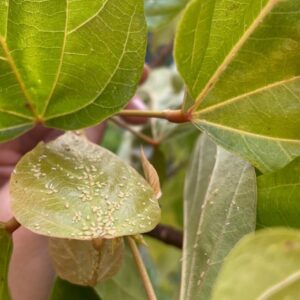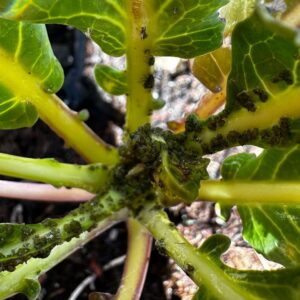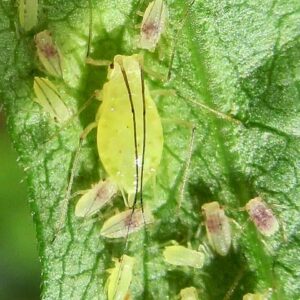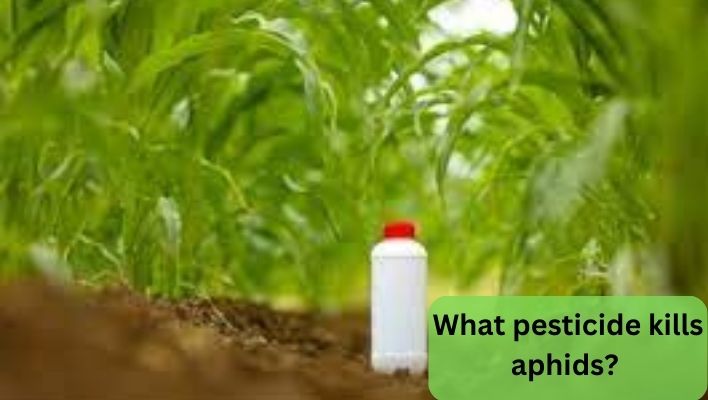Do you have an aphid problem in your garden or on your plants? These pesky little insects can cause serious damage, from stunting growth to transmitting plant viruses.
Aphids reproduce rapidly and can quickly infest plants, causing them to wilt, yellow, or die. They also excrete honeydew, which attracts other pests like ants and can lead to the growth of black sooty mold.
Given the harm that aphids can do, it is important to control their populations using effective methods. One such method is the use of pesticides. Pesticides are chemical substances that are designed to kill or repel pests.
They come in different forms, such as sprays, granules, or liquids, and can be applied directly to plants or used as soil treatments. Pesticides can effectively control aphids, reduce their populations, and protect plants and crops from damage.
However, using pesticides safely and responsibly is important to minimize potential risks to human health and the environment. Here are some of the alternatives to chemical pesticides to get rid of aphids from your plants.
Luckily, plenty of pesticides on the market can help get rid of aphids and prevent further infestations. But with so many options out there, how do you know which one to choose?
This article will explore the best pesticides for killing aphids, from chemical sprays to natural alternatives. Whether you’re a seasoned gardener or a beginner, this guide will help you find the right pesticide for your needs and keep your plants healthy and happy.
Why use Pesticides for Aphid Control
Pesticides are an effective way to control aphid populations and protect plants from damage. Using pesticides for aphid control offers several benefits; below are some of the most significant ones:

- Effective control: Pesticides can be very effective in controlling aphids. They work by killing or repelling insects, reducing their populations, and preventing them from causing further damage to plants and crops.
- Cost-effective: Compared to other methods of aphid control, such as manual removal or natural predators, pesticides can be more cost-effective in the long run. They require less labor and time and can protect plants and crops for an extended period.
- Easy to use: Pesticides are easy to use and apply, even for people with limited experience in pest control. They come in different forms and can be applied using various methods, such as sprays or granules.
- Safe: When used properly, pesticides are generally safe for human health and the environment. However, it is important to follow the instructions on the label carefully and take all necessary precautions to minimize any risks.
- Improved crop yields: By controlling aphids and other pests, pesticides can help improve crop yields and increase the quality of fruits, vegetables, and other crops.
While pesticides offer many benefits for controlling aphids, it is important to use them responsibly and in accordance with label instructions. Overuse or misuse of pesticides can have negative consequences for the environment, human health, and the long-term sustainability of agriculture.
Always follow safety guidelines and use the recommended amount of pesticide for the specific crop or plant you are treating. Also, using pesticides responsibly and considering alternative pest control methods whenever possible is important.
Types of pesticides that kill aphids
There are several types of pesticides that are effective against aphids. These include both chemical and organic options. Here is an overview of each type and their advantages and disadvantages:
Chemical Pesticides:
Chemical pesticides are synthetic substances that are designed to kill or repel pests. They are widely used in agriculture and horticulture to control aphids and other pests.
The advantages of chemical pesticides include the following:
- High effectiveness: Chemical pesticides can provide rapid and effective control of aphids, reducing their populations and protecting plants and crops from damage.
- Wide availability: Chemical pesticides are widely available and can be easily obtained from garden centers or online stores.
- Long-lasting protection: Some chemical pesticides can provide long-lasting protection against aphids, reducing the need for frequent applications.
The disadvantages of chemical pesticides include the following:
- Health and environmental risks: Some chemical pesticides can be toxic to humans and wildlife and can contaminate soil and water. It is important to use them safely and follow the instructions on the label carefully.
- Residue on food: Chemical pesticides can leave residue on fruits and vegetables, which can harm human health if ingested in large quantities.
- Resistance: Overuse or misuse of chemical pesticides can lead to developing pesticide-resistant aphids, making control more difficult in the future.
Organic Pesticides:
Organic pesticides are derived from natural sources such as plants, minerals, or microorganisms. They are often considered safer and more environmentally friendly than chemical pesticides.
The advantages of organic pesticides include the following:
- Safer for the environment: Organic pesticides are generally less toxic and have fewer environmental risks than chemical pesticides.
- Safe for beneficial insects: Organic pesticides are less likely to harm beneficial insects such as bees and ladybugs, which can help control aphids naturally.
- Low residue on food: Organic pesticides leave little to no residue on fruits and vegetables, making them safer for human consumption.
The disadvantages of organic pesticides include the following:
- Less effective: Organic pesticides may not be as effective as chemical pesticides, especially against severe infestations of aphids.
- Short-lived protection: Organic pesticides may need to be applied more frequently than chemical pesticides to maintain effective control.
- Limited availability: Organic pesticides may be harder to find and more expensive than chemical pesticides.
Systemic pesticides:
Systemic pesticides are chemicals plants absorb and transport throughout the plant’s tissues. They can effectively control aphids, as the insects ingest the pesticide along with the plant sap. However, systemic pesticides can also harm beneficial insects and other non-target organisms.
Advantages:
- Highly effective in controlling aphids
- can provide long-lasting protection
- It can be applied through soil treatments.
Disadvantages:
- It can be harmful to non-target organisms,
- may have negative environmental impacts,
- It may be less effective in high-temperature conditions.
When choosing a pesticide for aphid control, it is important to consider the specific needs of your plants and the potential risks and benefits of each type of pesticide.
It is also important to follow the instructions on the label carefully and take all necessary precautions to minimize any potential risks.
Overall, the choice of pesticide will depend on several factors, including the severity of the infestation, the type of plants being treated, and the potential risks to human health and the environment.
It is important to carefully consider these factors and choose an effective, safe, and environmentally sustainable pesticide.
Best pesticides for killing aphids
There are several effective pesticides for killing aphids. Here are some of the most popular options:
BioAdvanced 3-in-1 Insect Disease and Mite Control
This pesticide is a systemic pesticides that is absorbed by plants and provides up to 12 months of protection against aphids and other pests. It works by killing insects on contact or ingesting treated plant tissue.
- How to use: Mix the product according to the instructions on the label and apply it to the soil around the base of the plant. Alternatively, it can be applied as a foliar spray.
- When and where to apply: Apply early in the growing season or at the first sign of aphid infestation. It can be used on ornamental plants, trees, and shrubs.
- Safety precautions: Wear protective clothing and gloves when handling the product. Avoid contact with skin and eyes.
Safer 5118-6 Insect Killing Soap Concentrate
This pesticide is an organic option that is made from potassium salts of fatty acids. It works by breaking down the protective coating on the aphids, causing them to dehydrate and die.
- How to use: Mix the product according to the instructions on the label and apply it as a foliar spray directly onto the aphids.
- When and where to apply: Apply when aphid infestations are present on ornamental plants, vegetables, and fruit trees.
- Safety precautions: Wear protective clothing and gloves when handling the product. Avoid contact with skin and eyes.
Bonide Annual Tree & Shrub Insect Control with Systemaxx
This pesticide is another systemic product that provides up to 12 months of protection against aphids and other pests. It works by being absorbed by the roots and transported throughout the plant’s tissues.
- How to use: Mix the product according to the instructions on the label and apply it as a soil drench around the base of the plant.
- When and where to apply: Apply in the early spring or fall when the soil is moist, and the plant is actively growing. It can be used on ornamental trees and shrubs.
- Safety precautions: Wear protective clothing and gloves when handling the product. Avoid contact with skin and eyes.
Garden Safe Houseplant and Garden Insect Killer
This pesticide is another organic pesticide that is made from botanical extracts. It works by suffocating the aphids and other pests by blocking their respiratory system.
- How to use: Apply the product directly to the aphids and surrounding plant areas.
- When and where to apply: Apply when aphid infestations are present on houseplants, vegetables, and fruit trees.
- Safety precautions: Wear protective clothing and gloves when handling the product. Avoid contact with skin and eyes.
Bonide Captain Jack’s Neem Oil Concentrate
This is an organic pesticide and fungicide made from neem oil, a natural insecticide. It works by interfering with the aphids’ hormonal systems, preventing them from feeding and breeding.
- How to use: Mix the product according to the instructions on the label and apply it as a foliar spray.
- When and where to apply: Apply when aphid infestations are present on ornamental plants, vegetables, and fruit trees.
- Safety precautions: Wear protective clothing and gloves when handling the product. Avoid contact with skin and eyes.
When applying pesticides, it is important to follow the instructions on the label carefully and apply them only as directed. Generally, it is best to apply pesticides early in the morning or evening when temperatures are cooler, and the wind is calm. This will help prevent the product from evaporating or being blown away before it can take effect.
To get the best results, it is important to target the areas where aphids are present and to apply the pesticide thoroughly to all
sides of the plant, including the undersides of leaves and stems. This will ensure that all the aphids are exposed to the pesticide.
When handling pesticides, it is essential to take safety precautions to protect yourself and others. Always wear protective clothing and gloves when handling and applying pesticides. Keep children and pets away from treated areas until the pesticide has dried completely.
It is also essential to store pesticides securely away from children and pets. Follow the instructions on the label for proper storage and disposal of the product.
Natural Alternatives to Chemical Pesticides
While chemical pesticides can be effective in controlling aphid infestations, some people prefer to use natural alternatives. Some of the effective naturals ways include:
Introducing Aphids natural predator
Natural predators of aphids include ladybugs, lacewings, and parasitic wasps. These insects feed on aphids and can help keep their populations under control.
They can be attracted to your garden by planting various plants that provide food and shelter for these insects. Plants like dill, fennel, and yarrow are all good choices for attracting these beneficial insects to your garden.
Using Homemade insecticidal soap and oils
Another natural alternative to chemical pesticides is homemade insecticidal soap and oils. These are made from natural ingredients and are safe for plants and the environment. To make insecticidal soap:
- Mix a tablespoon of liquid dish soap with a quart of water and spray on the affected plants.
- For insecticidal oils, mix a few tablespoons of vegetable oil with a teaspoon of liquid dish soap and a quart of water.
- Shake well and spray on affected plants.
Another natural alternative to chemical pesticides is to use homemade insecticidal soap and oils. These can be made with common household ingredients like dish soap, garlic, and neem oil. Insecticidal soap works by disrupting the cell membranes of insects like aphids, causing them to dry out and die. Neem oil, on the other hand, works by interfering with the insect’s hormones and ability to feed.
To make homemade insecticidal soap, mix one tablespoon of dish soap with one quart of water and apply it to plants using a spray bottle. For neem oil spray, mix one tablespoon of neem oil with one quart of water and apply to plants using a spray bottle. These natural alternatives can effectively control aphids while being safe for the environment.

It’s important to note that while natural alternatives can be effective, they may not be as potent as chemical pesticides and may require more frequent application. Additionally, it’s important to identify the specific type of aphid infestation to determine the best course of action.
In conclusion, natural alternatives to chemical pesticides include attracting natural predators of aphids and using homemade insecticidal soap and oils. While these options may not be as potent as chemical pesticides, they are safe for plants and the environment and can effectively control aphid infestations.
In conclusion, natural alternatives to chemical pesticides, such as introducing natural predators and using homemade insecticidal soap and oils, can effectively control aphids. By attracting natural predators to your garden and using safe and natural insecticides, you can protect your plants from damage while also being environmentally conscious.
What pesticide kills aphids FAQs
Can I use natural remedies to control aphids?
Yes, several natural remedies can be effective in controlling aphids. These include introducing natural predators like ladybugs and lacewings, using insecticidal soap and oils, and planting companion plants that repel aphids. These natural remedies can be just as effective as chemical pesticides while also being safer for the environment.
Are pesticides harmful to beneficial insects?
Yes, chemical pesticides can be harmful to beneficial insects like ladybugs, lacewings, and parasitic wasps, which are natural predators of aphids, as well as other wildlife like birds and fish. Using pesticides carefully and sparingly is essential to avoid harming beneficial insects and other wildlife.
How do I know if I have an aphid infestation?
You can tell if you have an aphid infestation by looking for small, soft-bodied insects that are usually green or black in color. Aphids often congregate on new growth, buds, and the undersides of leaves.
Some signs of an aphid infestation include curling or yellowing leaves, sticky residue on leaves or stem, and the presence of ants on the plant. You may also notice sticky honeydew on leaves, a sign that aphids are present.

Can I prevent aphids from coming back?
Yes, there are several ways to prevent aphids from coming back. One way is to regularly inspect plants for signs of infestation and remove any affected leaves or stems. Planting companion plants like marigolds, chives, and garlic can also help deter aphids.
Using natural predators like ladybugs and lacewings can also help keep aphids under control. Also, practicing good garden hygiene by removing weeds and debris is a good way of keeping your plants free of these pests.
Is it safe to use pesticides around children and pets?
No, pesticides can be harmful to children and pets. Following the instructions carefully is essential as keeping children and pets away from treated areas until the pesticide has dried completely.
Keep children and pets away from treated areas until the pesticide has dried completely, and store pesticides in a secure location away from children and pets.
What is the residual effect of pesticides on plants and crops?
The residual effect of pesticides on plants and crops can vary depending on the type of pesticide used and the application rate.
Some pesticides have a short residual effect and break down quickly in the environment, while others can persist in the soil and water for longer periods.
It is important to follow the instructions on the label and use pesticides responsibly to minimize their environmental impact.
How long does it take for pesticides to work on aphids?
The time it takes for pesticides to work on aphids can vary depending on the type of pesticide used, the severity of the infestation, and other factors like weather conditions.
Some pesticides may work within a few hours, while others may take several days to a week to be effective.
Contact pesticides like insecticidal soap and oils can work quickly, while systemic pesticides may take longer to show results. It is important to follow the instructions on the label and reapply as necessary for the best results.
Conclusion
Aphids can be a serious problem for gardeners and farmers alike. However, several effective methods exist for controlling aphids, including pesticides and natural remedies.
When choosing a pesticide, it is important to consider the type of aphid and the specific plant or crop being treated to ensure maximum effectiveness.
Additionally, practicing good garden hygiene and attracting natural predators can help prevent aphids from returning.
To effectively control aphids, it is important to take action early and follow the instructions carefully. Always wear protective clothing and take safety precautions when handling and applying pesticides. These steps can protect your plants from aphids and ensure a healthy garden or crop.
Lastly, regularly inspect your plants for signs of aphids and take action at the first sign of an infestation. By being proactive and using the right pesticide or natural remedy, you can keep your plants healthy and thriving.








